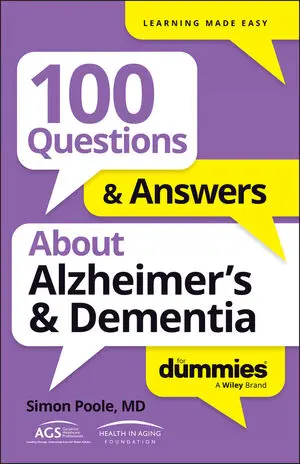Oops! Something went wrong while submitting the form.
Articles & Books From Alzheimer's & Dementia
Your Handy Reference for Alzheimer's & Dementia: Popular Questions and Answers If you or a loved one is dealing with Alzheimer's or dementia, or if you simply want to gain a better understanding of these conditions, look no further. 100 Questions & Answers About Alzheimer's & Dementia For Dummies is your complete guide to understanding the causes, signs, and diagnosis of these cognitive disorders.
Article / Updated 08-21-2016
Not every nursing home is a great place. AARP published the following list of warning signs of a bad nursing home. If you encounter one or more of these negative indications, run, don't walk, out of there and definitely do not place your loved one in that facility. Odors: A strong smell of urine and feces indicates a shortage of staff to help residents to the bathroom or to keep residents and the facility clean.
Article / Updated 08-21-2016
You can start by checking the bulletin board in your local senior center or community center. People looking for work as aides often post their credentials there. If you can't locate any potential candidates that way, place an ad in the local paper or post a notice at the senior center. If you're a member of a church or synagogue, ask around to see if anyone is interested in the job or has used such a service.
Article / Updated 08-21-2016
Many families feel that they don't have any other choice but to care for their loved ones at home without outside assistance. According to the Alzheimer's Association, 28 percent of caregivers have annual incomes less than $20,000. Financial constraints force them to personally shoulder the burden of providing care for their loved ones.
Article / Updated 08-21-2016
If your loved one isn't yet ready for an assisted living facility or a nursing home but you don't feel that your situation is conducive to providing 24/7 in-home care, adult daycare is for you.Adult daycare for people with dementia and its newer cousin, adult day healthcare, can be a real godsend for a two-career family that simply can't provide in-home care during work hours and doesn't like the idea of leaving their loved one alone at home all day alone or with an aide.
Article / Updated 08-21-2016
Your loved one won't require as much care in the early stages of dementia or AD as he or she will in the later stages. For someone with very mild memory loss, perhaps all you'll need is someone to ensure that medications are taken as prescribed. The care plan you start out with will change and become more comprehensive as your love one's condition progresses.
Article / Updated 08-21-2016
Talking about end-of-life care options may seem a bit disheartening, especially because the end may still be many years away. But now, as soon as possible after diagnosis, is the time to discuss your loved one's wishes for her end-of-life care. You're going to have to make more decisions than you might think, so you want to start early.
Article / Updated 08-21-2016
Many advances in scientists' understanding of Alzheimer's disease (AD) and its effects upon the brain have come from the study of brains donated by the families of deceased Alzheimer's patients. In addition, some families find closure when they choose to donate their loved one's brain, because a post-mortem brain autopsy is still the only way to confirm a diagnosis of AD with absolute certainty.
Article / Updated 08-21-2016
In the United States, most people older than 65 have access to the Medicare program. In other parts of the world, people with dementia who can't afford to pay for their healthcare can become unnecessarily disabled as a result.Making good and sensible use of what is available is thus important. People with a memory disorder obviously need help specifically for whatever disease is producing their symptoms.
Article / Updated 08-21-2016
Patients with memory disorders such as dementia and Alzheimer's disease (AD) function best in a calm and well-structured environment. That means eliminating potential sources of trouble as much as you can. According to the National Center for Injury Prevention, falls are the leading cause of injury deaths in adults aged 65 and older.



